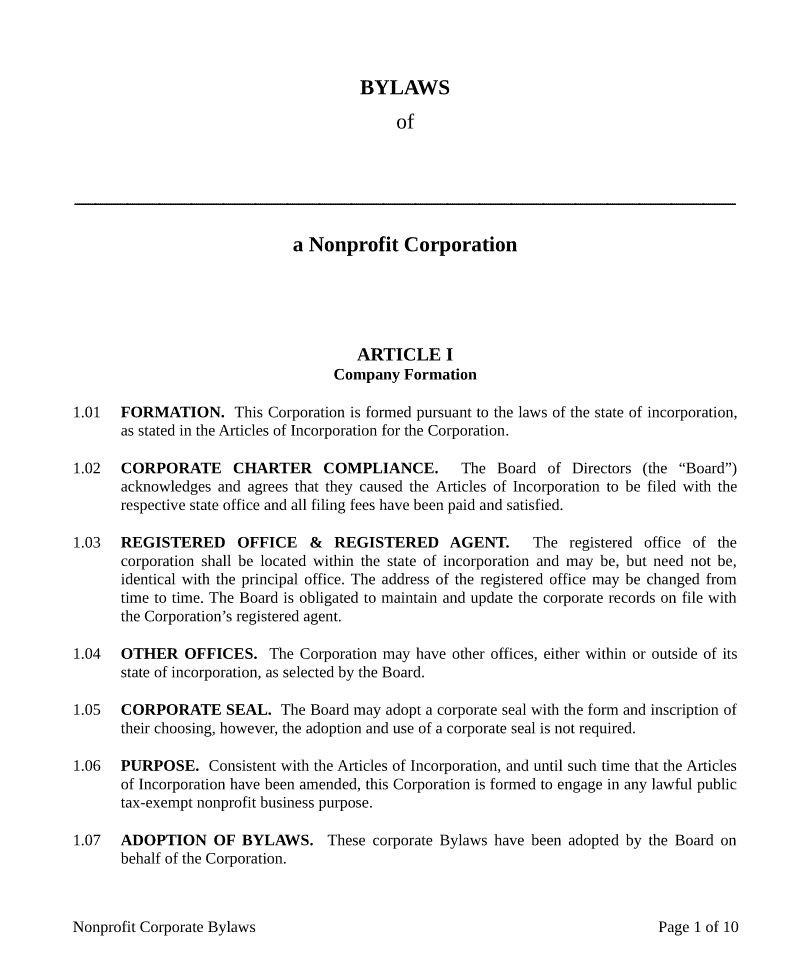California Nonprofit Bylaws
California nonprofit bylaws lay out the governing rules for your organization. Your bylaws provide your members with procedures for managing your board of directors, taking votes, keeping company records, changing your bylaws or structure, and more. Because bylaws also include protocols for dealing with conflicts, your bylaws help safeguard your nonprofit from potentially disruptive internal clashes and negative legal consequences.
Drafting strong bylaws is a crucial aspect of starting your nonprofit right, so we’ve made our attorney-drafted bylaws available to get you started.
Why does a California nonprofit need bylaws?
Although you don’t need to file your bylaws with the California Secretary of State like your Articles of Incorporation, state law mandates adopting bylaws. In fact, many nonprofits choose to make their bylaws available to the public, increasing accountability and trust with frequent donors.
1. Nonprofit bylaws are legally required in California.
Even if your bylaws aren’t public, you’ll need to keep a copy on file to remain in compliance with state law. California requires all nonprofit corporations to adopt bylaws as part of the business formation process. For reference, CA Corp. Code § 5151 describes the information you should include when creating your initial bylaws.
2. Third parties will ask to see your bylaws.
You’ll likely need to provide your bylaws to various third parties in the course of doing business. For example, opening a bank account, seeking additional funding, and renting office space will necessitate showing your bylaws to financial institutions, investors, and landlords. The IRS also instructs you to attach a copy of your bylaws to your 501(c)(3) tax-exempt status application.
3. Nonprofit bylaws allow you more control over your nonprofit.
While California state law provides some rules and guidelines for creating your bylaws, your nonprofit has the choice to add and adapt rules to meet your organization’s needs and preferences, as long as they don’t violate state law. The operating procedures outlined in your bylaws also protect your members’ rights and your nonprofit as a whole by setting a clear course of action to take in the case of a dispute. Without bylaws in place, your nonprofit may be vulnerable to legal entanglements in circumstances such as disagreements between board members or conflicts of interest.
Want to learn more? Check out our Guide to Nonprofits.
What do California Nonprofit Bylaws include?
The first part of your California nonprofit bylaws should contain basic information about your company, such as its name, purpose, and address. The subsequent sections should serve as your nonprofit’s operating manual, providing exact guidelines for running your organization. At the very least, your bylaws should include rules for:
- managing board members and meetings, including adding and removing board members
- taking votes and meeting quorum requirements
- compensating members and keeping financial records
- merging or dissolving your nonprofit
- amending your bylaws
You are also free to individualize your bylaws by adding provisions that apply specifically to your nonprofit—so long as you don’t violate California state laws.
Are nonprofit bylaws legally binding?
Yes. Your bylaws are a legally binding agreement and your members must adhere to them. Board members, officers, or employees who violate your bylaws could place your nonprofit in jeopardy by opening up the possibility for legal investigations and entanglements.
Are nonprofit bylaws public record?
This really depends on your nonprofit. If you apply for 501(c)(3) tax-exempt status with the IRS, your bylaws will become part of the public record. You must attach a copy of your bylaws to your application, and the IRS makes all tax-exempt applications public. You may also choose to publish your bylaws to foster a sense of accountability and transparency with your donors and the public at large.
FAQs
There is no legal requirement to have your bylaws signed. However, it is customary and recommended that your board of directors sign your bylaws. Having your board members’ signatures serves as a gesture of good faith, indicating that all members are dedicated to your nonprofit’s mission and success.
Yes. You can amend your bylaws. In fact, your bylaws should contain a provision allowing for and explaining the amendment process. Reviewing your bylaws regularly and amending them as necessary will ensure that your nonprofit continues to operate effectively.
Bylaws are adopted either by your incorporators or your board of directors at your nonprofit’s first organizational meeting.
